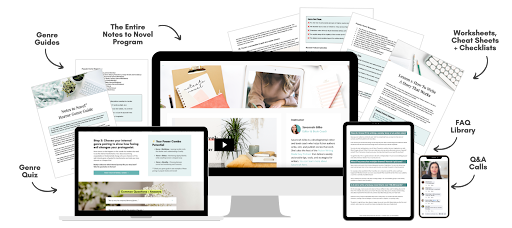Why Writing Advice Is Keeping You Stuck (And What to Do Instead)

LISTEN ON APPLE PODCAST | LISTEN ON SPOTIFY | LISTEN ON YOUTUBE
You know that browser bookmark folder labeled "Writing Advice"?
The one with 147 articles about plot structure, 83 posts on character development, and that YouTube playlist titled "How to Write a Novel" that you started three months ago but never finished?
Yeah, that one.
Here's the thing... all that advice you're collecting? It might be the exact reason you haven't finished your novel.
I know that sounds backwards. After all, you're being responsible, right? You're learning the craft. You're preparing. You're making sure you know what you're doing before you dive in.
But here's what I've noticed after working with hundreds of aspiring authors: The writers who consume the most advice often write the least.
Let me share a story that might sound familiar. One of my students spent five years—FIVE YEARS—writing and rewriting the first few chapters of her novel. She'd read an article about opening hooks and go back to revise. She'd discover a new plotting method and start over. She'd listen to a podcast about character voice and think, "Oh no, I've been doing it all wrong!"
Eventually, she scrapped the whole thing.
Sound familiar?
The Advice Trap (And Why You Keep Falling Into It)
Here's what's really happening when you're stuck in research mode:
You're not actually learning to write. You're learning to avoid writing.
Every new piece of advice becomes another reason to doubt what you've already written. Every expert's "must-have" becomes another standard you're failing to meet. Every contradictory opinion becomes another excuse to stop and reconsider everything.
The Psychology Behind Procrastination
And I get it. I really do.
When you're just starting out or you've been stuck writing your novel for a while, it feels safer to keep learning than to risk doing it "wrong." Your inner critic whispers things like:
- "You need to know more before you start"
- "Real writers understand all this stuff already"
- "If you just find the right method, writing will be easy"
- "You're not ready yet"
But here's the truth bomb you need to hear: You will never feel ready enough.
Why More Information Makes Everything Harder
Think about this for a second...
When you're trying to write a novel, you're already juggling about 47 different elements: plot, character development, dialogue, pacing, world building, theme, voice, scene structure, and approximately 39 other things.
Now add to that the fact that every expert has their own terminology, their own "foolproof" method, and their own strong opinions about the "right" way to do things.
The Save the Cat method says your inciting incident should happen at the 10% mark. The Hero's Journey calls it the "call to adventure" and suggests 12-15%. The three-act structure puts it at the end of Act One. The Story Grid has different terminology altogether.
One expert swears by detailed 40-page outlines that map out every scene. Another insists outlines kill creativity and you should "write into the dark." Some say you must know your ending before you begin. Others say discovering the ending is half the fun.
No wonder you're paralyzed!
One of my students described it perfectly. They'd consumed almost every writing podcast (yes, even mine!), bought multiple courses, and knew more about writing craft than many published authors. But despite having all that knowledge, they couldn't finish a draft.
Why? Because too much information creates too many choices. And too many choices create paralysis.
The One Question That Changes Everything
Instead of asking "What else do I need to learn?" try asking yourself this:
"What would happen if I only followed one approach all the way through?"
Not the "perfect" approach. Not a combination of seventeen different methods. Just one complete system from start to finish.
Here's what happened when my students made this shift:
Jenny went from 12 years of false starts to completing her first draft in 6 months—despite being a busy mom with a full-time job and elderly parents to care for.
Lindsay spent six months trying to draft on her own and only managed 25,000 words. After committing to one clear process? She wrote 100,000 words in the next six months.
Another writer went from five years of rewriting the same chapters to actually finishing a complete manuscript.
And yes, these are people just like you who finally stopped collecting advice and started following a process.
The Truth About "Writing Rules"
Here's something most writing gurus won't tell you:
Any complete system will work better than ten partial systems.
Why? Because despite all the different terminology and timelines, most credible writing methods are trying to get you to the same place. They all want you to:
- Create compelling characters readers care about
- Build a plot that keeps pages turning
- Develop meaningful conflict and stakes
- Deliver a satisfying ending
The Save the Cat beats, the Hero's Journey stages, the three-act structure—they're all just different maps to the same destination. It's like having five different GPS apps giving you directions to the same restaurant. The street names might be different, the estimated arrival time might vary by a few minutes, but they'll all get you there.
The problem comes when you try to follow all five GPS directions at once. That's when you end up driving in circles.
It's like trying to bake a cake by following five different recipes at once. You take the flour amount from Recipe A, the baking time from Recipe B, the mixing method from Recipe C... and you end up with a mess that doesn't resemble cake at all.
But if you just pick ONE recipe and follow it all the way through? You'll probably end up with a pretty decent cake. Maybe not perfect on the first try, but definitely cake.
The same is true for your novel.
What Actually Works (Based on Hundreds of Real Writers)
After helping hundreds of writers move from stuck to finished, here's what I know for sure: the writers who finish their novels do three things differently:
1. Stop Preparing and Start Practicing
Here's the connection most writers miss: You can't learn to write by reading about writing any more than you can learn to swim by watching Olympic footage.
Sylvia had been consuming writing advice for years (even re-reading the same content multiple times!). Despite working on her third novel, she found herself struggling with low daily word counts and feeling defeated. The breakthrough? Remembering that her job was to "discover" her story, not write a polished draft.
Now here’s where our brains like to trick us… Preparing to write feels productive. You’re taking notes! You’re researching castles! You’re setting up Scrivener!
But practicing—actually putting words on the page, even messy ones—that's where real learning happens. Your first draft is supposed to be messy. It's supposed to have problems. That's literally what first drafts are for: discovering your story.
You learn more from writing one terrible scene than from reading fifty articles about scene structure.
2. Choose One Path and Stick With It
Imagine you're driving from New York to Los Angeles. You could spend months researching every possible route, comparing highways, reading reviews of rest stops, and debating the merits of northern vs. southern paths.
Or you could just... pick a major highway and start driving.
Will it be the absolute most efficient route? Maybe not. But you'll actually get to LA, while the person still researching routes is still sitting in their driveway in New York.
Choosing one path doesn't mean you're married to it forever. It just means you're committing to following it all the way through your first draft. You're giving yourself permission to stop shopping for methods and start writing your book.
One student who wrote 114,000 words in just 88 days didn't have a secret superpower. She just picked one approach and followed it without looking back, without second-guessing, without checking to see if another method might be "better."
3. Measure Progress, Not Perfection
Here's where the mindset shift gets real: Writers who finish books care more about forward momentum than polished prose.
Instead of asking "Is this chapter good enough?" they ask "Did I move the story forward today?"
Instead of thinking "I need to fix this scene before I continue," they think "I'll make a note and keep going."
They understand that you can't edit a blank page, but you can absolutely edit a messy one. They know that perfection is something you work toward in revision, not something you achieve in a first draft.
They measure success by pages written, not by pages perfected. And paradoxically, this leads to better writing—because they actually finish drafts that can then be polished into something wonderful.
Your Next Step (Yes, Just One)
I know what you might be thinking: "Okay Savannah, but which process should I follow? How do I know I'm picking the right one?"
Here's the thing—you're doing it again. You're looking for the perfect answer instead of taking action.
So let me make this super simple for you:
Pick the teacher or method that resonates with you most and commit to following their complete system for your entire first draft.
That's it.
No mixing and matching. No second-guessing. No shopping for additional opinions.
Just one approach, followed all the way through.
What This Looks Like in Real Life
Let's get specific about what "sticking to one method" actually means:
Say you're following a structured approach (like mine) and you come across a blog post claiming every scene needs seven specific elements—but the method you're following teaches five. Instead of panicking that you're missing two crucial elements, you recognize that different teachers simply break down the same concepts differently. You stick with the five-element approach you're already using.
Or maybe you're halfway through your outline when you discover a podcast about "pantsing" (writing without an outline). Instead of abandoning your outline to try this "better" method, you file it away as something to potentially explore for your next book.
When your inner critic says, "But what if another method would help you write faster/better/easier?" you respond with, "Maybe, but I'm going to find out what THIS method can do first."
It's not about blindly following rules. It's about giving yourself the gift of focus.
Final Thoughts
Right now, you have two options…
You can keep collecting advice. Keep reading articles. Keep watching videos. Keep telling yourself you'll start "when you know enough." Keep rewriting Chapter One for another five years.
Or you can choose one complete system and follow it all the way to "The End."
I know which one I'd choose. (Spoiler: It's the one that actually results in a finished novel!)
Now, I know making this shift, from collecting to creating, isn't easy. That inner voice saying "but what if there's a better way?" doesn't just disappear overnight.
This is exactly why I created my Notes to Novel course. It's the complete step-by-step system that takes the guesswork out of writing a novel—the exact process that's helped hundreds of writers finish their books. Enrollment opens soon, and if this resonates with you, I'd love to have you join us. Click here to get on the waitlist!
👉 Want more help right now? Check out these free resources:
- Listen to the Fiction Writing Made Easy Podcast for weekly writing guidance
- Take the Author Success Blueprint Quiz to get personalized next steps for your writing, editing, and publishing journey
- Grab my free guide to see how real writers (like you!) pushed past these roadblocks to finish their novels: 5 Writing Roadblocks Keeping You Stuck & How to Break Through

